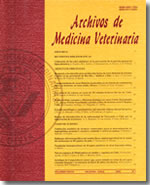Brainstem's auditory evoked potentials in rhesus monkeys (Macaca mulatta) in different physiologic stages under captivity
Main Article Content
Abstract
In the phylogenetic scale, audition plays a very important role in the development of elaborated behaviors. The aim of this study was to evaluate the auditive response in the Macaca mulatta species at different physiologic stages, through brainstem's auditory evoked potentials (BAEP). 30 non-human primates Macaca mulatta were allotted into two groups of 15 males and 15 females distributed in five age-dependant groups of 2 males and 2 females as follows: Group 1 (0,1-3,1 year old); Group 2 (3,2-6,1 year old); Group 3 (6,2-9,1 year old); Group 4 (9,2-12,1 year old) and Group 5 (12,2-27,1 years and older). The BAEP were obtained by the stimulation of the ear with rarefaction clicks of 50 dB of intensity. The cerebral electric activity was picked up by gold disc electrodes, placed in the Cz (+), A1, A2 (–) and Fz derivations as land, according to the 10/20 international system. Four waves were detected in the five evaluated groups. Since no significant differences were found in the ANOVAs by separated afferences, an ANOVA of united afferences was done. It was observed that groups 1 and 5 provided significant differences in all evaluated waves, showing the extended latencies in relation to other groups. It was concluded that BAEP made it possible to identify changes that are generated from the development, maturation and aging in rhesus monkeys.

